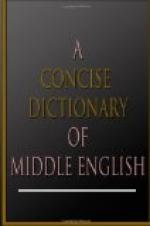Aynding, sb. smelling, B; see Onding.
Ayr, sb. oar, B; see Ore.
Belde, adj. big, blustering, S; see Bold.
Belt, pp. built, S3; see Bilden.
Beode, v. to pray, S; see Bidden.
Bersten, v. to burst, S, C; see Bresten.
Betaken, v. to betoken, S2; see Bitoknen.
Bi-healde, v. to behold; bihalden, S2; see Bi-holden.
BilA|de, pt. s. enclosed, S; see Bi-*leggen.
BilA|uen, v. to remain, S; see Bi-leuen.
Billet, sb. a piece of firewood; byllets, pl., S3 (26. 785).
Binam, Binom; pt. s. of Bi-nimen.
Bi-so3*te, pt. s. of Bi-sechen..
Bituhhe, prep, between, S; see Bi-*twi3*e.
Blane (for blan), pt. s. of Bi-linnen.
Blynke. For sie read see.
Bod, pt. s. waited, S2; bode, waited for, S2; see Biden.
Bounden, pp. bound, S, C2; see Binden.
Breas, sb. brass, S; see Bras.
Breggid, pt. s. shortened, W; see A-*bregge.
Bulde, pt. s. built, C; see Bilden.
Bye, v. to buy, S2; by, C3; see Biggen.
Camel. The regular OF. equivalent for Lat. came*lum was chameil. In OF. camel the termination _-el_ is due to analogy with French forms derived from _-a*lem_. See BH, ASec. 43.
Canoun. Church Lat. canonicus did not mean originally ’one on the church-roll or list,’ but one who was bound to observe a certain rule of life (canon, [Greek: kanon]). OF. chanoine is not the precise equivalent of canonicum, but represents a Latin type *_canonium_. See Scheler’s Diet. (ed. 3).
Cherche, sb. church, S2, C3; see Chirche.
Clomben, pp. climbed, C; see Climben.
Daw, sb. day, S2; see Day.
Deburs, v. disburse, pay, S3; see Disburse.
Dedeyn, sb. disdain, W, H; see Disdeyn.
Degyset, pp. disguised, S2; see Disgysen.
Deserited. For Desheriten, see Disheriten.
Dide, pt. s. did, caused, put, S; see Don.
Dilitable, adj delightful, S2; see Delitable.
Diuise, v. to tell of, describe, S2; see Deuisen.
Drui3*est, 2 pr. s. art dry, S2; see Drye.




